Gut health is a hot topic, and for good reason. It turns out that taking care of the city of organisms that live in your gut can have a major influence on your wellness and weight. Probiotics are a popular supplement that supply your gut with health-promoting microorganisms. (1)
What are the best probiotics for weight loss? Not just any probiotic will do. Though research is in the early stages, scientists have identified strains of microorganisms that may potentially help reduce body weight and fat mass. (2) We’ve carefully evaluated over a dozen of the best probiotics using our established parameters, giving you a list of the best ones available for weight loss.
To evaluate your risk of an eating disorder or disordered eating, take the National Eating Disorders Association (NEDA) free assessment. For additional support, please contact the NEDA helpline at 1-800-931-2237.
Best probiotic for weight loss overall
Ritual Synbiotic+ tops our list for best probiotic for weight loss overall. Ritual takes a comprehensive approach with their 3-in-1 supplement that includes prebiotics, probiotics, and postbiotics for total gut health. It’s vegan friendly, gluten-free, third-party tested, and requires no refrigeration.
Medical disclaimer: This article is intended for educational and informational purposes only. It is not intended as a substitute for medical advice. For health advice, contact a licensed healthcare provider.
Our picks for the best probiotic for weight loss
- Best overall: Ritual Synbiotic+
- Best for gut health: VSL4 Gut Capsules
- Best for men: Nutricost Probiotic Complex
- Best GLP-1: Pendulum GLP-1 Probiotic
- Best for women: Sports Research Daily Probiotics
- Best for constipation: Transparent Labs Gut Health
- Best for bloating: Legion Biome
- Best for belly fat: Seed DS-01 Daily Synbiotic
- Best with digestive enzymes: Unbloat
- Best for menopause: Better Body Co. Provitalize
Compare probiotics for weight loss
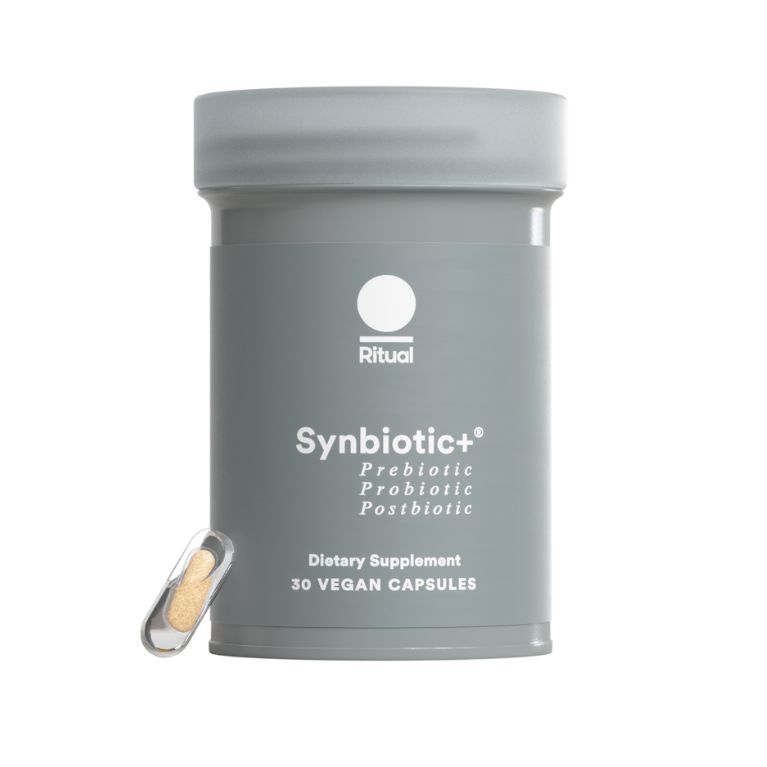
|
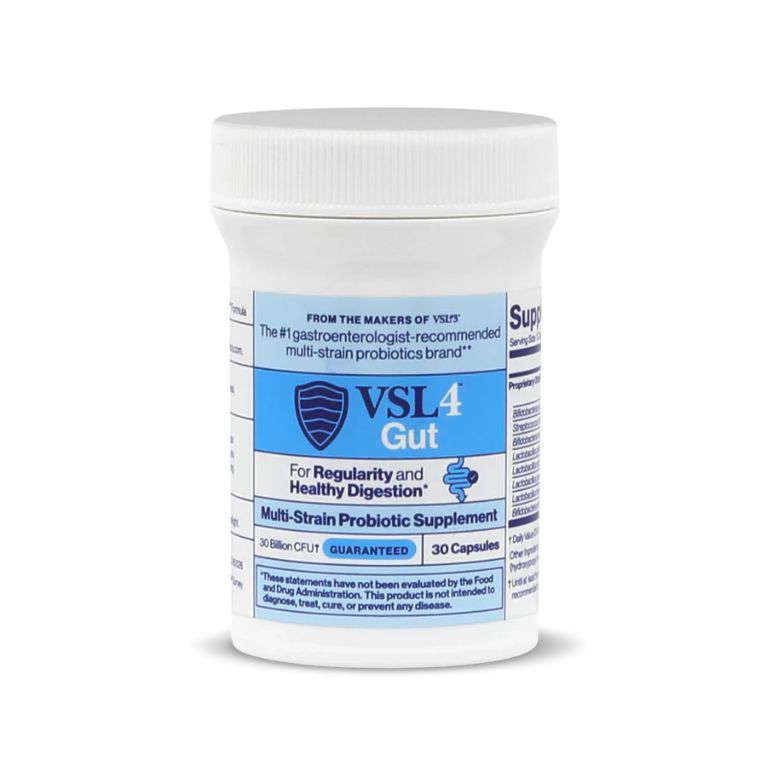
|
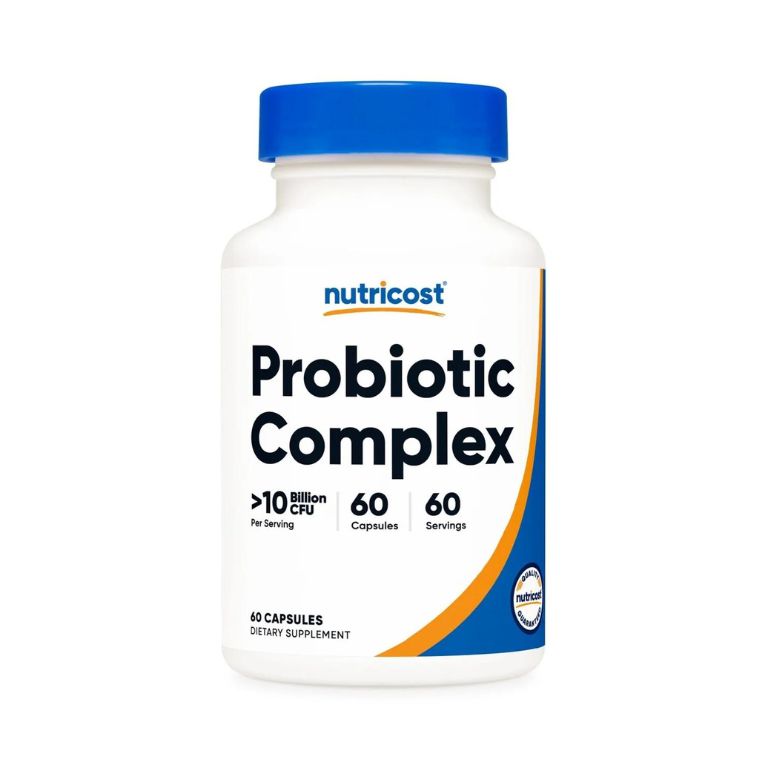
|
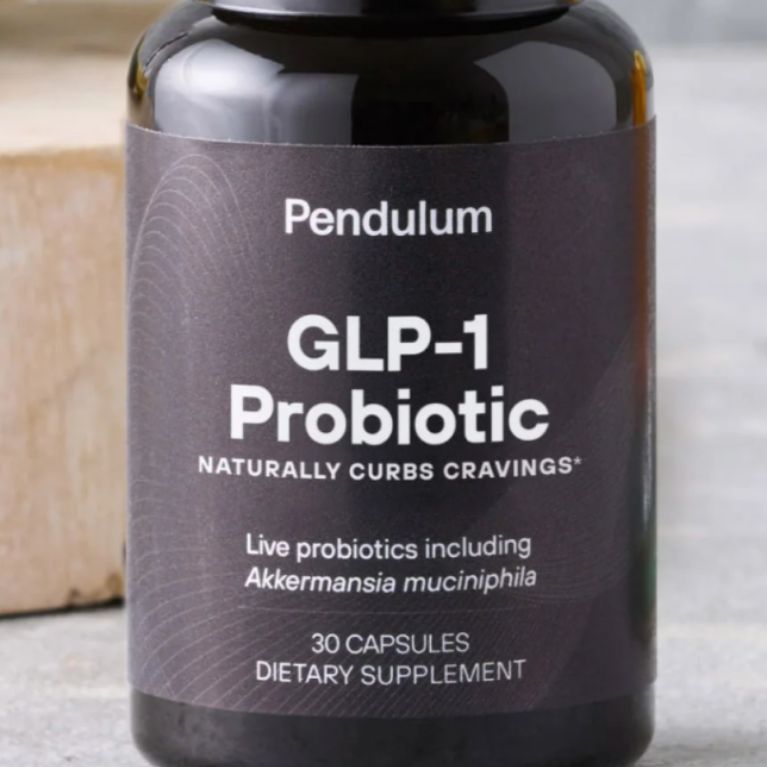
|
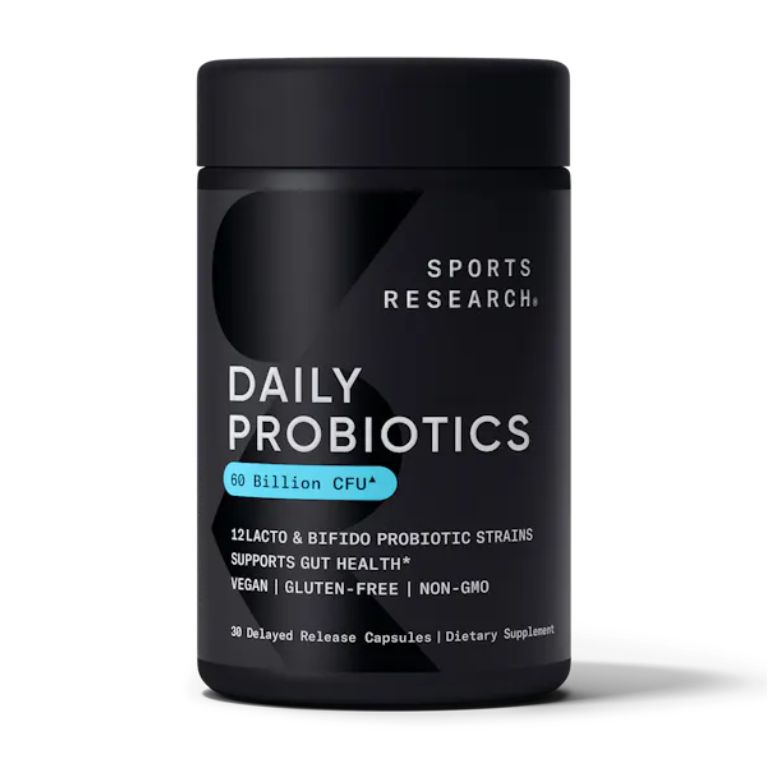
|
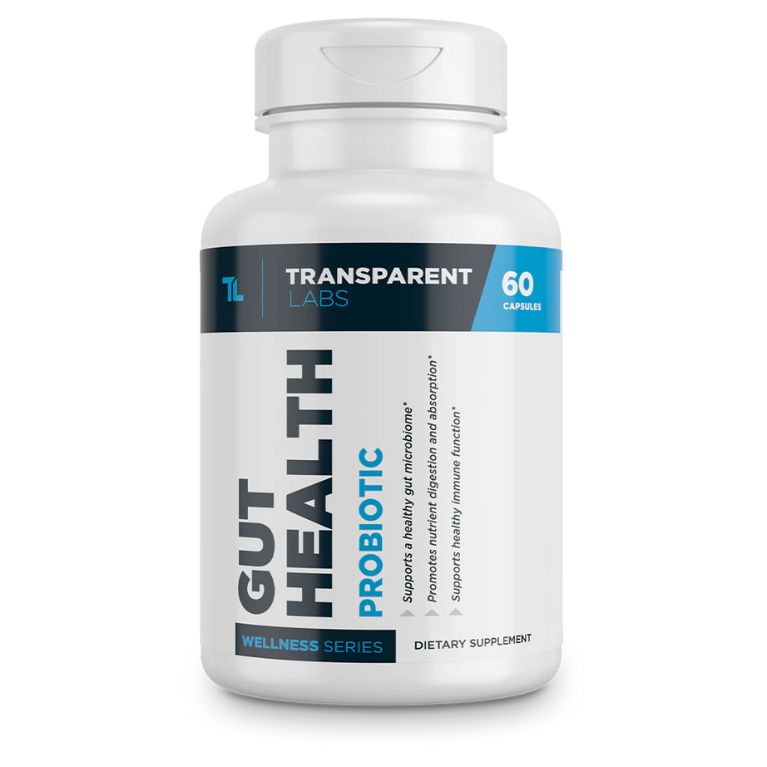
|
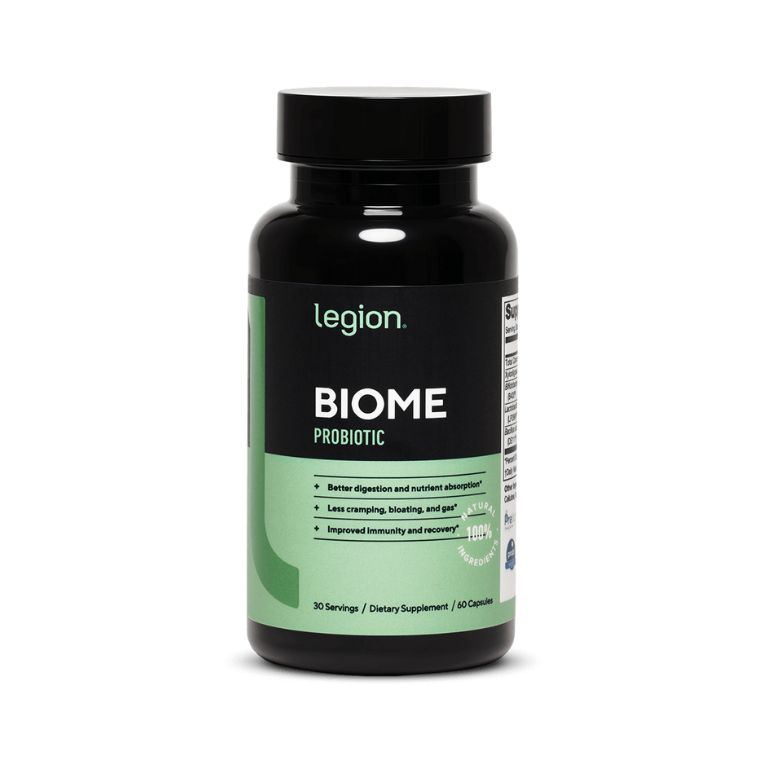
|
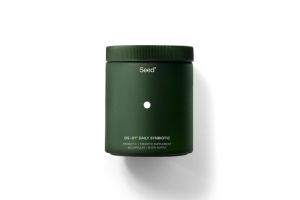
|
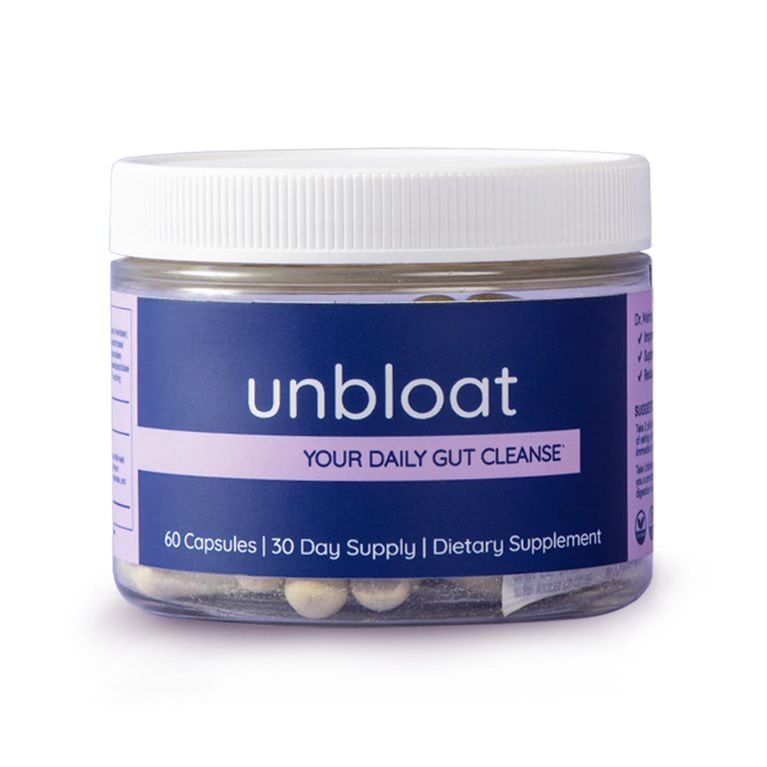
|
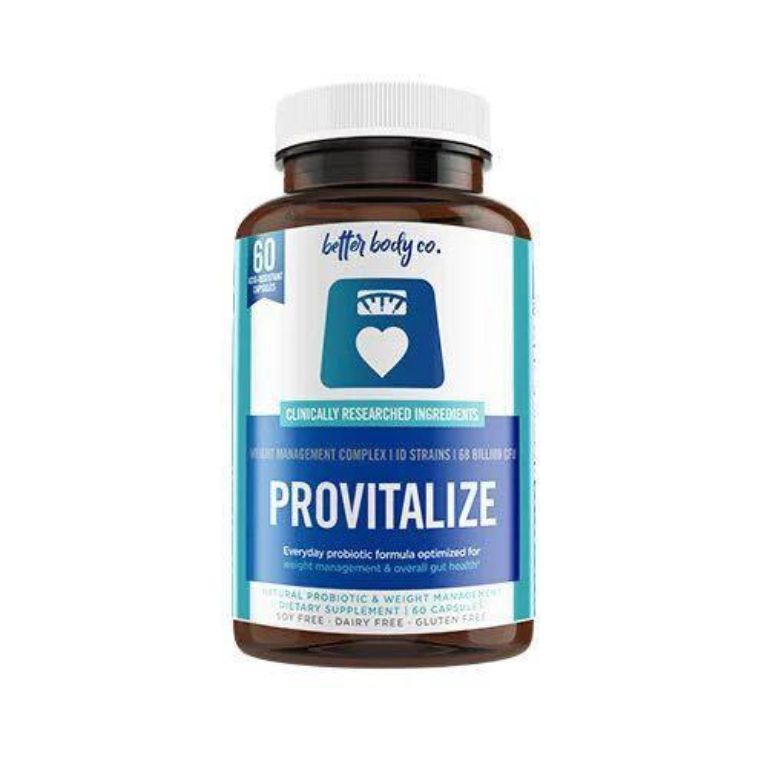
|
|
| Ritual Synbiotic+ | VSL4 Gut Capsules | Nutricost Probiotic Complex | Pendulum GLP-1 Probiotic | Sports Research Daily Probiotics | Transparent Labs Gut Health | Legion Biome | Seed DS-01 Daily Synbiotic | Unbloat | Better Body Co. Provitalize | |
| Rating | ||||||||||
| Price | $54 ($1.80/serving) | $34.95 ($1.17/serving) | $19.95 ($0.33/serving) | $95 ($3.17/serving) | $24.95 ($0.83/serving) | $46 ($1.53/serving) | $50 ($1.67/serving) | $50 ($1.67/serving) | $65.95 ($2.20/serving) | $44.10 ($1.47/serving) |
| Form | Capsule | Capsule | Capsule | Capsule | Capsule | Capsule | Capsule | Capsule | Capsules | Capsules |
| Dosage | One capsule | One capsule | One capsule | One capsule | One capsule | Two capsules | Two capsules | Two capsule | Two capsules | Two capsules |
| Key probiotics | Lactobacillus rhamnosus, Bifidobacterium | Streptococci, Lactobacilli, Bifidobacteria | Lactobacillus acidophilus, Lactobacillus plantarum, Lactobacillus rhamnosus, Lactococcus lactis, Lactobacillus casei, plus 5 more | Clostridium butyricum, Akkermansia muciniphila, Bifidobacterium infantis | Lactobacillus plantarum, lactobacillus lactis subsp lactis, bifidobacterium animalis subsp lactis, lactobacillus acidophilus | Lactobacilli, Bifidobacteria, Streptococci | Bifidobacterium lactis, Lactobacillus plantarum, Bacillus subtilis, Xylooigosaccharide | Bifidobacterium longum, Bifidobacterium breve, Lactobacillus plantarum | Lactobacillus casei, Lactobacillus plantarum, Lactobacillus acidophilus, Lactobacillus rhamnosus, Bifidobacterium longum, Bifidobacterium bifidum | L. grassi, Bifidobacterium breve, Bifidobacterium animalis |
Best probiotic for weight loss overall: Ritual Synbiotic+
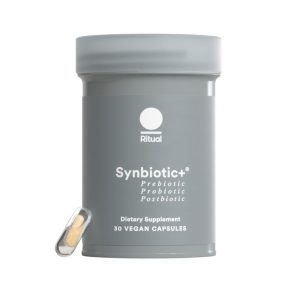

Key product features
What you should know
Ritual Synbiotic+ is a complete gut health supplement that includes beneficial probiotics for weight loss, along with prebiotics and postbiotics.
- Our product testers appreciated the minty smell and taste of Ritual Synbiotic+ and said the capsule was easy to swallow.
- At $54 a bottle, Ritual Synbiotic+ is expensive but on par with many high-quality probiotic supplements. The price goes down to $43.20 a bottle with a subscription.
- This probiotic supplement is best suited for people looking for a complete supplement for gut health.
- The capsule’s coating helps protect the microorganisms from stomach acid.
Why we like Ritual Synbiotic+ as best overall for weight loss
Ritual Synbiotic+ is a comprehensive gut health formula. Ritual sets themselves apart from other supplement companies with their supply chain transparency and dedication to sustainable practices. They take this same approach when creating their supplements.
Synbiotic+ is a 3-in-1 formula with prebiotics, probiotics, and postbiotics. Prebiotics feed the friendly bacteria in your gut. (3) Probiotics are the source of friendly bacteria. (3) Postbiotics are substances that support the well-being of the microorganisms. (4) Grouped together, these substances are called synbiotics.
Your gut microbiota, or the makeup of the organisms that live in your large intestine, has a significant influence over your health. (5) It helps with digestion, makes nutrients, and supports the immune system. Researchers also find that the balance of good bacteria to bad bacteria in the gut can affect weight and risk of chronic diseases like obesity and Type 2 diabetes. (5)
Certain strains of microorganisms may have the potential to help people with obesity lose weight and fat. (2) Synbiotic+ contains some of the strains linked to weight loss—Lactobacillus rhamnosus and Bifidobacterium species. However, in many of the researches studies we reviewed, participants who lost weight while taking probiotic supplements also followed a calorie-restricted diet, an exercise program, or both. (2) This research suggests that probiotics may help you reach your weight goals if you also eat a balanced diet and get regular physical activity.
Synbiotic+ has a special capsule that protects the microbes, ensuring as many organisms as possible reach the colon. Our testers said they had no problems swallowing the capsule and liked the minty taste.
Bowel regularity and improved bowel health are additional potential benefits of Synbiotic+. One of our testers said she had more regular bowel movements and less bloating with trigger foods while taking Synbiotic+. Another tester also saw improvements in digestion but was unhappy about the price so she stopped taking it.
At $54 a bottle, Synbiotic+ is on the higher end of what we’ve seen for probiotics. However, it’s one of the most comprehensive supplements we’ve come across. Buying this 3-in-1 probiotic means you only need one supplement, not three.
Another drawback of Synbiotic+ is its use of proprietary blends, a secret recipe for a mix of ingredients in the supplement. With a proprietary blend, supplement makers only have to list the ingredients in the blend, not the amounts. Without knowing the dose of individual ingredients, you can’t determine any potential risks or whether you’re getting the most effective dose. (6)
What customers are saying
Customers on Amazon say the supplement is easy to take and gentle on the stomach. Some customers also say the price is too high and they have received damaged merchandise.
“These have made me feel so much better. Not to be TMI, but my toilet and I are finally friends and not enemies. They can be a bit pricey, and you get the occasional fishy burp, but I wouldn’t trade them for the world.”
Jay, Amazon
Stephanie, another verified customer, says it’s the best probiotic she’s ever tried.
Mary FE is a verified Amazon customer who didn’t tolerate the supplement. “I love their vitamins so I thought I’d give these a try. Very disappointed. Very expensive. I’ll stick to my old synbiotic that gave me zero issues.”
Specs
| Form | Capsule |
| Daily dose | One capsule |
| Key probiotics | Lactobacillus rhamnosus, Bifidobacterium animalis ssp lactis |
| CFU | 11 billion |
| Servings per container | 30 |
| Third-party tested | Yes |
| Storage | Cool, dry place |
Best probiotic for gut health and weight loss: VSL4 Gut Capsules
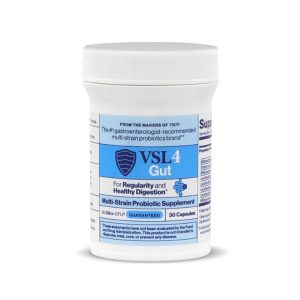

Key product features
What you should know
VSL4 Gut Capsules provide eight complementary strains of probiotics that have been clinically shown to support digestive health by promoting integrity of the intestinal lining. (7)
- VSL4 Gut Capsules contain the same strains of VSL#3, a probiotic medical food that doctors recommend as nutrition support for people with irritable bowel syndrome (IBS) and ulcerative colitis. (7)
- At $1.17 per serving, VSL4 Gut Capsules are averagely priced and a good value for a high-quality supplement.
- This is a good choice for individuals looking for a comprehensive gut health supplement to support weight loss goals and regularity.
Why we like VSL4 Gut Capsules as best for gut health and weight loss
VSL4 Gut Capsules contain the same strains of probiotics as VSL#3, a probiotic medical food that supports gastrointestinal health by promoting the integrity of the intestinal lining and helping balance the microorganisms in the gut. (7) The gut-benefitting strains include Lactobacillus plantarum, Streptococcus thermophilus, Lactobacillus acidophilus, and Bifidobacterium lactis. (3,8)
A medical food, like VSL#3, is categorized by the FDA as a specially formulated product given under medical supervision for the specific dietary management of a disease or condition. (9) Medical foods aren’t regulated like drugs, but the products must comply with FDA requirements for food and are monitored by a physician. (9)
VSL4 Gut contains three probiotic species—Lactobacilli, Bifidobacteria, and Streptococci—that support gut health. (3) It’s the combination of these species that supports digestion, bowel regularity, and general gut health by strengthening the intestinal lining and balancing the gut’s microbial composition. (7)
Though not designed for weight loss, VSL4 Gut contains specific probiotic strains that may support weight loss, including Lactobacillus acidophilus with Lactobacillus casei and Bifidobacterium. (2)
There’s also some evidence that the unique probiotic formula may prevent weight gain when consuming a high-calorie, high-fat diet. (10) That said, that’s based on a small study of 20 non-obese males taking the VSL#3 supplement, which has 112.5 billion CFUs per serving versus the 30 billion CFUs in the VSL4 Gut. (10) More research is needed for clinical certainty regarding weight loss claims.
Studies of VSL#3 also show that the multistrain formula may reduce abdominal pain, bloating, and diarrhea in people with IBS and ulcerative colitis. (7)
At $1.17 per serving, VSL4 Gut Capsules are averagely priced for probiotic supplements. You can also save 10%, or $3.39 per bottle, with a monthly subscription. And, VSL4 Gut is health savings account (HSA) and flexible spending account (FSA) eligible, so you may save an additional 30 to 40% if approved.
VSL4 Gut is shelf-stable, unlike other VSL probiotic formulas. The gut health supplement also uses a special capsule that delays release of the microorganisms, protecting them as they travel through the digestive system until they reach the large intestine.
It’s unclear whether or not VSL4 is third-party tested.
What customers are saying
Most Amazon customers have positive things to say about VSL4 Gut Capsules. Many consumers find that the supplement helps with their gastrointestinal concerns and they like that it’s shelf-stable. However, not everyone finds the supplement effective.
Verified Amazon customer Annette Y. writes, “ Helping my gut so much, thanks VSL4 Gut!!!”
Many of the reviews are from Amazon Vine customers, who received products for free because they provide authentic reviews.
“I have been taking these on alternate days with another probiotic to increase the amount and variety of intestinal and colon flora, and I have found that the increased variety is helpful; I now have fewer gut issues.”
Mark N., Amazon
Amazon customer Paul, on the other hand, isn’t sold on the effectiveness of VSL4 and writes, “My stomach problems haven’t seen much improvement still early.”
Specs
| Form | Capsule |
| Daily dose | One capsule |
| Key probiotics | Bifidobacterium lactis, Streptococcus thermophilus, Lactobacillus plantarum, Lactobacillus acidophilus, Lactobacillus paracasei, Lactobacillus helveticus, and Bifidobacterium breve |
| CFUs | 30 billion |
| Servings per container | 30 |
| Third-party tested | Unclear |
| Storage | Shelf-stable |
Best probiotic for weight loss for men: Nutricost Probiotic Complex
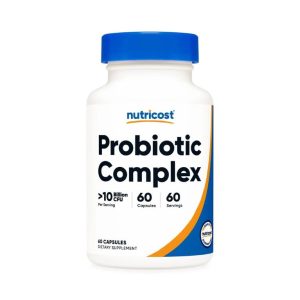

Key product features
What you should know
Nutricost Probiotic Complex is a safe and effective supplement with friendly bacteria that support a healthy gut and promote a healthy weight.
- Nutricost Probiotic Complex provides two months’ worth of probiotics in one bottle.
- At $19.95 a bottle, or $0.33 per serving, Nutricost’s probiotic costs less than the market average.
- This supplement is best for adults who want a simple but effective probiotic to replenish the friendly bacteria in their digestive tract without the high price.
Why we like Nutricost Probiotic Complex as best for men
Nutricost Probiotic Complex provides the beneficial microbes your gut needs. Many factors influence the gut microbiome, including genetics, diet, and sex. Though in the early stages of research, studies show that the specific strains of microorganisms in the gut differ in males and females. (11) Taking a probiotic supplement made for men can help improve health and performance.
Nutricost Probiotic Complex has many of the same friendly strains of bacteria found in other supplements, including Lactobacilli and Bifidobacteria. Research suggests these strains may help with weight loss efforts and keep you regular. (2,12)
Probiotics may be able to help aid men in their weight management goals by increasing production of the hunger-controlling hormone glucagon-like peptide 1 (GLP-1). (2) This hormone is made in the lower part of the digestive tract. (13) It slows down the movement of food, keeping you full longer. It also activates the satiating center in the brain, letting you know you’re full. Nutricost’s probiotic may influence your appetite, helping you eat less to support your weight goals.
Nutricost Probiotic Complex is non-GMO and gluten-free. It’s suitable for people who follow a vegetarian diet, but may not work for those on a vegan diet because probiotics in supplements are often grown in a dairy starter culture. (14)
Each batch of Nutricost Probiotic Complex is third–party tested at an independent and accredited lab. The supplement has a CFU count of more than 50 billion. However, you may not get the full dose of microorganisms since the capsule isn’t enteric coated, so it may not fully protect the microbes as it travels through the stomach and small intestine.
One bottle costs $19.95 and has a two-month supply of capsules. The dose is one capsule a day, so you pay $0.33 per daily dose. By far, Nutricost Probiotic Complex is the most affordable probiotic on our list and half the price of most probiotics on the market. You can save even more with a subscription.
Read our full Nutricost Probiotic Complex review for more information.
What customers are saying
Amazon customers rate Nutricost Probiotic Complex favorably. They like the price and note that it helps calm the stomach and support sleep.
Verified Amazon customer DS says, “Great product for a reasonable price.” Other customers agree.
Verified Amazon customer with the username C says Nutricost probiotic helped them recover from colon surgery. “I had part of my colon removed a year ago and had to wear an ostomy bag. In January, 22 they put me back together and my body works better than ever thanks to an excellent surgeon and the Nutricost Probiotic. I highly recommend this product.”
Some customers were concerned about how to store the supplement. One customer reported having an allergic reaction.
Specs
| Form | Capsule |
| Daily dose | One capsule |
| Key probiotics | Lactobacillus acidophilus, Lactobacillus plantarum, Lactobacillus rhamnosus, Lactococcus lactis, Lactobacillus casei, Saccharomyces boulardii, Bifidobacterium longum, Lactobacillus fermentum, Bifidobacterium bifidum, Lactobacillus gasseri |
| CFU | 50 billion |
| Servings per container | 60 |
| Third-party tested | Yes |
| Storage | Cool, dry place |
Best GLP-1 probiotic for weight loss: Pendulum GLP-1 Probiotic
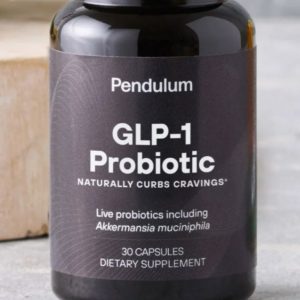

Key product features
What you should know
Pendulum GLP-1 Probiotic is formulated with probiotic strains, including Akkermansia, that may help increase GLP-1 and reduce cravings.
- Pendulum GLP-1 Probiotic contains 500 AFUs of probiotics per serving and 211mg of prebiotics in the form of chicory inulin.
- This product costs $3.17 per serving, making it the most expensive product on our list. Subscribing to a membership can help bring down the cost.
- Pendulum GLP-1 Probiotic comes with a high price tag and is formulated for specific support, so it’s best for those with weight loss goals rather than those looking for overall gut health support.
Why we like Pendulum GLP-1 Probiotic as best GLP-1 probiotic
Pendulum claims its GLP-1 Probiotic is designed to help naturally increase GLP-1. GLP-1 is a hormone made in the gut after we eat that helps regulate blood sugar and the feeling of fullness. (15) For example, GLP-1 agonists are medications that help manage blood sugar levels in the same way, like Ozempic and Trulicity. Pendulum GLP-1 Probiotic may hence work as a more natural form of weight loss support when used alongside a healthy diet and lifestyle.
Pendulum GLP-1 Probiotic is formulated with a proprietary blend of Clostridium butyricum, Akkermansia muciniphila, and Bifidobacterium infantis. There are 500 million AFUs per serving, though there isn’t information on how much of each strain is in the blend.
Some early research indicates Akkermansia muciniphila may support those with type 2 diabetes, but results will vary on an individual basis and more research is needed. (16) Additionally, in-vitro and animal studies show GLP-1 production increases in the body with Akkermansia supplementation, but there is not much research on how this translates to the human body. (17, 18)
Bifidobacterium infantis has been shown to support weight loss, and Clostridium butyricum may help reduce risk of infection and symptoms of bloat. (2, 19)
The formula also contains prebiotics in the form of chicory inulin, which help feed the probiotics in your gut. A one-capsule serving is a good option for those who do not like to take multiple pills.
This product may help support weight loss, but it should be used as an addition to your health and fitness routine, as it won’t work on its own. A one-time purchase of this product from Pendulum will cost you $95, or $3.17 per serving. To help reduce costs, you can purchase a membership for a one-, three-, or six-month supply.
What customers are saying
Pendulum GLP-1 Probiotic has over 180 reviews and an average rating of 3.6 on Amazon. Customers who positively review the item say that it’s effective, but even have concerns about the price.
“Good with helping reduce my food cravings. Easy to take as well. I think it’s a good and effective product but it’s a bit expensive,” said verified Amazon buyer Gillian P.
“These are working so far. I’ve lost a couple pounds. They help me go to the bathroom everyday instead of every 4 days. They taste fine and are easy to swallow.”
Erika L., Amazon
However, main complaints include the high cost and reviewers noting the product doesn’t work for them.
“I don’t find this made any difference in my cravings, appetite, or digestion. I have tried many probiotics and I didn’t notice any changes with this. Especially for how expensive it is, I expected more,” said verified Amazon customer Shannon.
Specs
| Form | Capsule |
| Daily dose | 1 capsule |
| Key probiotics | Clostridium butyricum, Akkermansia muciniphila, Bifidobacterium infantis |
| CFU | 500 million |
| Servings per container | 30 |
| Third-party tested | No |
| Storage | Refrigeration suggested |
Best probiotic for weight loss for women: Sports Research Daily Probiotics
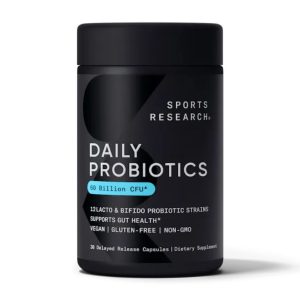

Key product features
What you should know
Sports Research Daily Probiotics supports gut health by replenishing and nourishing the friendly bacteria in the digestive tract.
- The supplement uses a special capsule that delays the release of the probiotics, protecting them from damage by stomach acid.
- At $19.96 for a 30-day supply, Sport Research Daily Probiotics is a good value.
- This is a great option for people looking for a safe and effective probiotic formula made with non-GMO ingredients.
- Sports Research says the probiotic is shelf-stable, but fine print on the supplement bottle recommends refrigeration.
Why we like Sports Research Daily Probiotics as best probiotic for weight loss for women
This probiotic supplement for both women and men contains prebiotics and probiotics to help support gut health. Supplementing with probiotics can be especially beneficial for women, since IBS is a common problem that causes uncomfortable symptoms such as intestinal gas and occurs two to six times more often in women than in men. (20)
Probiotic strains in this supplement include Lactobacillus plantarum, Bifidobacterium lactis, Lactobacillus rhamnosus, and Bifidobacterium species, which have been linked to weight loss (along with dietary and exercise changes). (2)
This supplement is non-GMO, which helps reduce your exposure to toxins and the risks they bring, like the potential for developing cancer. (21)
At $24.95 a bottle, Sports Research Daily Probiotics costs less than the average market price for probiotics and is one of the least expensive supplements on our list. With subscribe and save, the price drops $21.21, or $0.71 per capsule.
However, Sports Research uses a proprietary probiotic blend of various friendly strains of microorganisms that provides a total 60 billion CFUs. Because it’s a proprietary blend, the CFUs for each individual strain are unknown. The prebiotic in the supplement is also a proprietary fiber inulin blend that includes inulin, organic acacia senegal gum, and organic apple fiber. It’s unclear how much of each ingredient is in the blend.
Another concern we have about Sport Research’s probiotics is storage. The supplement maker highlights that it has a long shelf life when properly stored. But instructions aren’t clear on how to store the supplement with this statement. The brand says the product is shelf-stable, but smaller print in another area notes the product is “best stored refrigerated.”
If you don’t store probiotic supplements properly you risk harming the microorganisms, making them less effective. (22)
Check out our full Sports Research Daily Probiotic review for more information.
What customers are saying
Sports Research Daily Probiotics has more than 5,000 reviews on Amazon. Customers like the quality of the supplement and that it’s easy to take.
“These daily probiotics have been a true lifesaver for my easily irritable gut!”
Username “AnalogCyan,” Amazon
Another verified customer on Amazon who goes by “ejt07” says, “High quality and got everything moving in the right direction. Have tried several in the past that may not have been the right ‘mix’ for me but these things work.”
Negative reviews center around side effects like gas and bloating and lack of improvements in symptoms. Verified Amazon customer Mundioppa writes, “I am still having a gas problem. It does not seem to work well.”
Specs
| Form | Capsule |
| Daily dose | One capsule |
| Key probiotics | Lactobacillus plantarum, Lactobacillus lactis subsp lactis, Bifidobacterium animalis subsp lactis, Lactobacillus acidophilus, Lactobacillus fermentum, Lactobacillus rhamnosus GG, Lactobacillus casei, Lactobacillus paracasei, Bifidobacterium bifidum, Bifidobacterium breve, Bifidobacterium longum subsp. Infantis, Bifidobacterium longum subsp. Longum |
| CFU | 60 billion |
| Servings per container | 30 |
| Third-party tested | Yes |
| Storage | Refrigeration recommended to prolong shelf-life |
Best probiotic for constipation and weight loss: Transparent Labs Gut Health
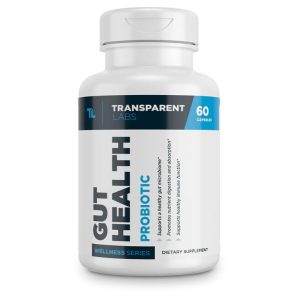

Key product features
What you should know
Transparent Labs Probiotic Advanced Gut Formula has 10 clinically studied strains of friendly bacteria that may benefit the gut and overall health.
- Transparent Labs Gut Health Probiotic formula contains the strains of bacteria associated with weight and fat loss.
- At $46 for a month’s supply, or $1.53 per serving, Transparent Labs Probiotic is an expensive supplement but similar in price to other top probiotic supplements.
- This probiotic is a good option for people who want a comprehensive supplement that supports gut health and helps with managing body weight.
Why we like Transparent Labs Gut Health as best for constipation and weight loss
Transparent Labs Gut Health Probiotic is our pick for the best probiotic for constipation and weight loss due to its choice of probiotic strains. Transparent Labs’s probiotic formula has 10 well-researched strains that offer several health benefits.
Your gut is home to trillions of microbes. (3) Lactobacilli and Bifidobacteria are the two most studied groups of bacteria in our microbiome, each with numerous species, and research shows they affect the immune system, skin, digestion, and heart health. (3) Transparent Labs Probiotic contains both of these strains.
A microbiome with low levels of these strains may affect the digestive system. Studies show that people with chronic constipation have lower levels of these two strains in their gut, but supplementing with probiotics that have Lactobacilli and Bifidobacteria species can help. (8)
Certain strains of Lactobacilli, including L. acidophilus, are unable to fully break down fructose and glucose and may cause weight gain. (2, 23) However, some studies show that Lactobacilli and Bifidobacteria can help improve body weight, lower body mass index (BMI), and decrease waist circumference in adults who are overweight or obese. (24) While these are promising results, the authors of the study recommend more research to confirm their findings.
The creators of Transparent Labs Gut Health Probiotic engineered their formula to promote a healthy gut microbiome and the benefits that come with it. It contains 100 billion colony-forming units (CFUs).
Probiotics are measured by CFUs. Most supplements have between 1 and 10 billion CFUs but can go higher. However, according to the Office of Dietary Supplements (ODS), part of the National Institutes of Health (NIH) that explores the science of dietary supplements, more CFUs doesn’t mean better results. (3) In fact, different stains can have different levels of proven support. The CFUs in the Transparent Labs Gut Health Probiotic may go beyond what you need.
In addition to its formulation, we also like Transparent Labs Probiotic because it’s third-party tested for banned substances, is gluten-free, and has no artificial ingredients.
At $46 for a 30-day supply of probiotics, this supplement is on the average-to-high end for probiotics. You need to take it on an empty stomach, which you may find inconvenient if you forget to take the supplement before you eat. You can also only buy the supplement from the company’s website, so you can’t shop around for the best price.
Read our full Transparent Labs Probiotic review for more information.
Specs
| Form | Capsule |
| Daily dose | Two capsules |
| Key probiotics | Lactobacilli, Bifidobacteria, Streptococci |
| CFU | 100 Billion |
| Servings per container | 30 |
| Third-party tested | Yes |
| Storage | Cool, dry place |
Best probiotic for bloating and weight loss: Legion Biome
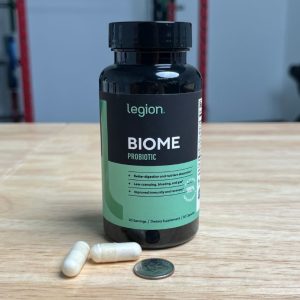

Key product features
What you should know
Legion Biome is a science-backed probiotic with strains of friendly bacteria that can support a healthy weight, increase metabolism, and improve body composition.
- Our product testers said the capsules were easy to swallow and small enough that they could take two at a time.
- One bottle of Legion Biome costs $50, or about $1.67 per serving. It’s more expensive than other supplements but in line with many of the probiotics on our list.
- This probiotic is a great choice for people who want a total body supplement that supports their nutrition and fitness goals.
- Legion offers a subscribe-and-save program that lowers the price of their probiotic to $45.
Why we like Legion Biome as best probiotic for bloating and weight loss
Legion Biome contains four ingredients that are dosed based on scientific research. It’s a 2-in-1 formula, combining a prebiotic and probiotic to nourish and promote the beneficial bacteria in the gut that can help reduce bloat.
The probiotics in Legion Biome include Bifidobacterium lactis, Lactobacillus plantarum, and Bacillus subtilis. B. lactis nurtures the gut, helps make certain nutrients, and counteracts the effects of toxic substances in the gut to help reduce inflammation. (1) Bifidobacteria species are also linked to weight loss, both alone or with other probiotics. (2)
Lactobacillus plantarum improves absorption of nutrients, plays a role in the production of short-chain fatty acids that help maintain the microbiome, and may aid weight loss. (1,2,12) When taken by itself, it may lower body weight and improve waist circumference. (2) However, in another study we reviewed, the participants also decreased their caloric intake while taking the probiotic. (25) This suggests that while probiotics can support weight loss efforts, a calorie deficit is still an important element.
Bacillus subtilis supports immune health and may help with appetite control and metabolism by improving the body’s absorption of protein. (26)
The prebiotic in Legion Biome is xylooligosaccharide, a carbohydrate naturally found in fruits, vegetables, and milk that supports the growth of the good gut bacteria. It is believed to be effective at a lower dose, so you get more of the benefits with fewer side effects.
Legion Biome is made with all-natural ingredients and lab tested for potency and purity. You can see the most recent third-party lab test results on Legion’s website.
At $50 a bottle, or $1.67 per serving, Legion’s probiotic has a higher price point than other supplements, but it’s a high-quality supplement that’s third-party tested for safety and potency. This means it contains what it says on the label. It’s not clear if it’s allergen-free or suitable for vegan, gluten-free, or dairy-free diets.
Our product testers had no problem taking the two capsule doses, saying it was easy to swallow. The instructions are specific and recommend taking the probiotic first thing in the morning with food.
What customers are saying
Most customers at Amazon give Legion Biome positive reviews. They say it helps with bloating and gas, improves digestion, and benefits overall health.
Verified Amazon customer Courtney A. says the capsules are easy to swallow and tasteless, and haven’t affected her regularity in any way.
Some customers said they didn’t notice any changes in digestion after taking Legion Biome. Others reported gastrointestinal problems.
Martyn B., a customer on Amazon wrote, “I deliberately chose this brand as it has a very good reputation and lots of satisfied customers, but unfortunately after trying these for a few days I ended up with a lot of gas.”
Specs
| Form | Capsule |
| Daily dose | Two capsules |
| Key probiotics | Bifidobacterium lactis, Lactobacillus plantarum, Bacillus subtilis |
| CFU | 25 Billion |
| Servings per container | 30 |
| Third-party tested | Yes |
| Storage | Cool, dark place |
Best probiotic for weight loss and belly fat: Seed DS-01 Daily Synbiotic
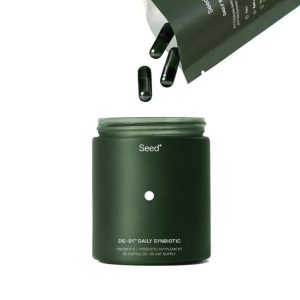

Key product features
What you should know
Seed DS-01 Daily Synbiotic is a high-quality, comprehensive probiotic and prebiotic supplement aimed at improving whole-body health.
- Seed’s Daily Synbiotic contains proprietary blends and a long list of ingredients that consumers should review before purchasing.
- At $50 a bottle, or $1.67 per serving, Daily Synbiotic sits at the upper range of pricing compared to the average market price. But it’s similar in price to other probiotics on our list.
- This is a great option for people looking for a comprehensive probiotic.
- Daily Synbiotic capsules can withstand the acidic contents of the stomach, meaning most of the bacteria reaches the colon.
Why we like Seed DS-01 Daily Synbiotic as best for belly fat and weight loss
Seed DS-01 Daily Synbiotic is a popular 2-in-1 probiotic and prebiotic supplement for adults. The makers of DS-01 Daily Synbiotic only use clinically studied strains of bacteria in their formulas. Their adult probiotic supplement, DS-01 Daily Synbiotic, is a broad-spectrum formula with 24 strains of microbes, each selected for its benefits.
Probiotics aren’t a replacement for lifestyle changes that lead to a healthier weight, but a supplement may support your efforts. Seed DS-01 Daily Synbiotic contains strains of microbes shown to support weight loss. (2) This includes several strains of Lactobacilli and Bifidobacteria, the two species that may produce the best results for improving body weight, whether taken individually or together. (2)
That said, no supplement, food, or exercise gives you the ability to pick and choose where you lose weight. Diet, activity levels, genetics, and overall health all influence which areas of the body slim down the fastest. To reduce body fat, you need to create a calorie deficit that forces your body to burn fat for calories (energy). (27) In turn, you get smaller all over, not in just one specific area.
Seed DS-01 Daily Synbiotic stands out from other supplements because of its broad-spectrum proprietary blends that support digestive health, skin health, heart health, and micronutrient synthesis. It also has Indian pomegranate, a prebiotic well-tolerated by people with IBS.
Seed’s probiotic is gluten-free, allergen-free, and vegan. It’s also third-party tested for safety. The dual capsule design features an outer prebiotic capsule and inner probiotic capsule. It’s engineered to improve survival of the microbes and ensure your body receives optimal doses once the capsule reaches your large intestine.
Though we find the formulation of Daily Synbiotic impressive, it contains a lengthy list of microorganisms. Individual probiotic needs vary and depend on health history and usual diet. Our experts recommend carefully reviewing the list and discussing the supplement with your doctor to determine the potential benefits before starting.
At $50 for a 30-day supply, Seed’s Daily Synbiotic is higher than average for a probiotic supplement. But given its broad-spectrum formulation and high-tech capsule, we think it’s a good value.
Check out our Seed probiotic review for more information.
What customers are saying
Most reviewers on Amazon find the supplement effective, though some report unwanted side effects.
“I have been using Seeds DS-01 probiotics for a few weeks now and I couldn’t be happier! Not only does it work but it surpasses the effectiveness of other probiotics I’ve tried in the past.”
Bel A, Amazon
Natalie is another verified customer with a positive review. “These capsules are really easy to take and have been keeping me regular.”
Cathy M. purchased the probiotic and had extreme side effects, including cramping, bloating, and nausea.
Specs
| Form | Capsule |
| Daily dose | Two capsules |
| Key probiotics | Bifidobacterium longum, Bifidobacterium breve, Lactobacillus plantarum, plus 21 others |
| CFU | 53.6 billion |
| Servings per container | 30 |
| Third-party tested | Yes |
| Storage | Cool, dry place |
Best probiotics and digestive enzymes for weight loss: Unbloat
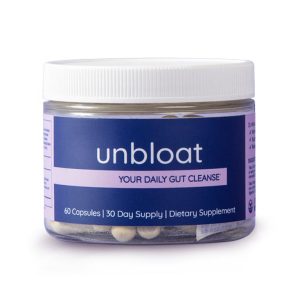

Key product features
What you should know
Unbloat is a comprehensive formula consisting of probiotics, prebiotics, digestive enzymes, and nutrients that may help manage inflammation. It also contains herbal supplements to help with bloating.
- Our product testers had a hard time following the very specific instructions on how to take the supplement. The label says to take two capsules within 30 minutes of eating and to take an extra pill when eating hard-to-digest foods.
- One bottle of Unbloat contains 30 servings (60 capsules) and costs $65.95, or $2.20 per serving. It’s on the high end of pricing for probiotics, but similar to the price of many other probiotics on our best list.
- This is a good supplement choice for someone looking to ease bloating and gas.
- Our product tester pointed out that it may take up to eight weeks to see benefits.
Why we like Unbloat as best probiotics and digestive enzymes for weight loss
While time is the primary treatment for bloating, taking a probiotic can help. We like Unbloat because it contains a number of ingredients that help digestion, including digestive enzymes, peppermint, fennel, and ginger, along with probiotics linked to weight loss.
Fennel is a home remedy for gas and bloating and the top bloat-fighting herb in the blend. The herbal supplement contains antispasmodic agents that support intestinal motility, easing the bloated feeling. (28)
Many people turn to peppermint oil as a natural remedy to ease IBS symptoms, abdominal pain, and indigestion. Some research shows that taking enteric coated peppermint oil capsules may help these symptoms. (29)
Unbloat also contains milk thistle, an herbal supplement people use to treat liver and gallbladder concerns and indigestion. It’s not known how well it might help with bloating. (30) However, the digestive enzymes in Unbloat may also reduce side effects from hard-to-digest foods like beans and broccoli. And, the supplement contains the strains of Lactobacilli and Bifidobacteria, which are associated with weight loss.
Unbloat is gluten-free, vegetarian, and non-GMO-verified. However, it doesn’t seem to have third-party testing for quality or safety. Unbloat comes with a higher price tag, retailing for $65.95 a bottle, but is still within the average range for the probiotic market. You can save about $6.75 per bottle when you subscribe to Unbloat’s quarterly delivery plan, getting a three-month supply every 90 days.
Our product testers found the instructions for when and how to take Unbloat difficult to follow. The company recommends taking one pill within 30 minutes of eating and adding an extra pill when eating food that’s extra rough for digestion.
Our testers also pointed out that the website says it takes six to eight weeks to see the benefits.
To learn more about this brand, check out our complete Unbloat review.
What customers are saying
Customers on Amazon have mixed reviews about Unbloat.
Verified customer Jackie says Unbloat is a game-changer and plans on ordering more.
Lizzie L. also likes Unbloat remarking, ” While this hasn’t been a miracle where I immediately noticed a difference, I definitely noticed enough of an incremental improvement. I definitely feel less bloated and feel like my body is better processing regularly.”
Another verified customer on Amazon who goes by “RCP” wasn’t happy with the supplement and said it caused stomach pain and bloating.
Specs
| Form | Capsule |
| Daily dose | Two capsules |
| Key probiotics | Lactobacillus casei, Lactobacillus plantarum, Lactobacillus acidophilus, Lactobacillus rhamnosus, Bifidobacterium longum, Bifidobacterium bifidum, B. lactis |
| CFU | 25 billion |
| Servings per container | 30 |
| Third-party tested | No |
| Storage | Cool, dry place |
Best probiotic for menopause weight loss: Better Body Co. Provitalize
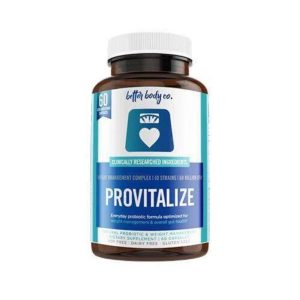
Key product features
What you should know
Better Body Co. Provitalize is a women’s probiotic aimed at relieving menopause symptoms, easing belly bloat, and assisting with weight loss.
- Provitalize contains a mix of probiotics and herbal supplements to rebalance the gut microbiome and eliminate bad cholesterol.
- At $49 a bottle, or $1.63 per serving, Provitalize comes with a higher-than-average price tag but is similar in cost to other probiotics on our list.
- Provitalize is for women looking for a natural approach to managing menopause symptoms.
- While Provitalize claims to improve fat breakdown, there’s no evidence that the ingredients in this supplement increase fat metabolism.
Why we like Better Body Co. Provitalize as best for menopause and weight loss
Better Body Co. Provitalize has a simple formula with all-natural ingredients and good manufacturing practice (GMP) certification.
Provitalize has a short list of probiotics that can help with bloating, digestion, and gut health, including Bifidobacterium breve, B. lactis, and Lactobacillus gasseri. It provides 68 billion CFUs.
L. gasseri, in particular, may help decrease body weight, waist circumference, and belly fat—common concerns during menopause. (2) In a randomized, double-blind, placebo-controlled trial, volunteers with a BMI between 25 and 35 received 10 billion CFUs of L. gasseri for 12 weeks in combination with a 200-calorie deficit and increased activity. The participants showed improvement in visceral fat, the unhealthy fat in the belly that surrounds the vital organs. (31)
For menopause, the other probiotics help with bloating, digestion, and gut health.
The herbal supplements in Better Body Co. Provitalize include moringa leaf for its anti-inflammatory and antioxidant effects and turmeric and curry leaf for joint health. (32,33)
We also like Provitalize because it’s made from all-natural ingredients without additives or fillers, and it’s GMP-certified. Additionally, the supplement is vegan and free of gluten, caffeine, and other stimulants. Most probiotics are stimulant-free, but it’s likely Provitalize calls this out because of its inclusion of herbal supplements and focus on weight management.
The makers of Provitalize claim that the supplement reduces gas, improves body composition, and boosts energy. However, the ingredients may cause unwanted side effects like an upset stomach from the moringa leaf. The turmeric may also interact with medications like aspirin or ibuprofen, increasing risk of stomach upset. Talk to your doctor before adding any supplements like Provitalize to your routine.
The Better Body Co. menopause probiotic is priced above the market norm at $49.00 for a 30-day supply. You can save about $9 a bottle by ordering a 90-day supply upfront.
What customers are saying
More than 33,000 people on Amazon have rated Provitalize. A large percentage of people have favorable things to say, but a few customers report that it doesn’t work as claimed.
“Bought one bottle to try. Is expensive, but seems to work. I have lost 4 lbs already. No dieting. Just not as hungry. No need for the miralax anymore. Sleeping all night even though I just take one in the morning.”
Loretta K., Amazon
Verified Amazon customer Lizette M. was hopeful when they received the supplement, but reported that it aggravated their IBS.
Specs
| Form | Capsule |
| Daily dose | Two capsules |
| Key probiotics | Lactobacillus gasseri, Bifidobacterium breve, B. lactis |
| CFU | 68 billion |
| Servings per container | 30 |
| Third-party tested | No |
| Storage | Cool, dry place |
How we test probiotics for weight loss
We know how hard it is to eat a balanced diet all the time, so we turn to supplements to fill in nutritional gaps. Choosing the right supplement that fits your goals and needs can make a world of difference. When selecting the best probiotics for weight loss, it’s important to take into consideration the ingredients, dose, how it helps, and how it makes you feel.
Our goal is to give you all the information you need so you can confidently choose a probiotic formula that aligns with your needs.
You can read our full probiotics testing methodology here.
Exclusion of proprietary blends—25%
Though there are thousands of different probiotic strains, specific ones tmay be targeted to weight loss. This is why avoiding proprietary blends is crucial for transparency, allowing you to know exactly what and how much of each ingredient is included.
Cultures contained—25%
We identify the specific strains of probiotics or beneficial bacteria present in the product that can help target weight loss. The importance lies in the fact that different strains offer distinct health benefits.
Whether they’re encapsulated with a food source—20%
We determine if the probiotic cultures are paired with a prebiotic or other food source that nourishes the bacteria during digestion. This can enhance the survival rate of probiotics as they navigate through the digestive system, ensuring they reach the intestines effectively.
Whether cultures are alive—15%
This examines whether the probiotic cultures in the product are alive and viable at the time of consumption, which are necessary for the probiotics to exert their beneficial effects in the gut. The effectiveness of the product often depends on the survival of these cultures through processing and storage.
Colony forming units (CFUs) at end of shelf life—10%
CFUs represent the number of live microorganisms, typically bacteria, present in a probiotic supplement at the end of its shelf life. We like to see probiotics that provide at least 20 billion or more CFUs, though these are the ranges we consider:
- Under 1 billion
- 1 Billion to 4.9 Billion
- 5 Billion to 9.9 Billion
- 10 Billion to 19.9 Billion
- 20 Billion+
Form—5%
The form is important because it can affect how easily the product is consumed, absorbed, and stored. Different forms may also have varying shelf lives and convenience factors for the user.
We evaluate:
- Capsules
- Tablets
- Powders
- Liquids
How to choose the best probiotics for weight loss
When choosing the best probiotic for weight loss, review the probiotic strains in the supplement. Not all strains of probiotics support weight loss and research is in the early stages.
Strains
Some of the strains of microbes linked to weight loss include: (2)
- Lactobacillus gasseri
- Lactobacillus casei
- Lactobacillus rhamnosus
- Lactobacillus curvatus with Lactobacillus plantarum
- Different strains of Lactobacillus acidophilus
- Lactobacillus acidophilus with Bifidobacterium infantis
- Lactobacillus acidophilus with Lactobacillus casei and Bifidobacterium
This list is preliminary and may change as we learn more about the types of probiotics that support weight loss.
Dosage and storage
You also want to look at dosage and storage. Most clinical studies looking at probiotics and weight loss used doses ranging from 1 million CFUs to 50 billion CFUs. (2) Probiotics are live microorganisms and lose their potency if not stored properly. Some probiotic supplements may require refrigeration.
Third-party testing
Also, look for third-party testing to make sure the supplement contains the ingredients listed on the label and is safe. (34) Some supplements display third-party testing certifications on the label, while others provide testing information on their website.
How probiotics help with weight loss
Probiotics balance the beneficial bacteria with the bad bacteria in the digestive system, known as the gut microbiome. This in turn plays a role in weight loss by regulating digestion and food metabolization. Research shows that probiotics can help lower glucose, lessen fat around the waist, and make an impact on obesity. (31) Certain strains have been studied for their weight loss benefits, but more research is needed. Much of the current research to find the best probiotic to lose weight has been done on those with obesity.
Types of probiotics for weight loss
Many different types of probiotics may help you lose weight. However, many factors, including lifestyle, diet, and exercise will also affect your weight loss. A systematic review found that L. gasseri, and some strains of Lactobacillus acidophilus with Bifidobacterium infantis, may be the best probiotic strains to lose weight. (2) Additionally, Lactobacillus gasseri and Lactobacillus curvatus with Lactobacillus plantarum have been shown to decrease visceral fat and waist circumference. (31) Note these studies were done with participants with overweight and obesity. (2) Further research found a supplement with L. acidophilus, L. casei, and Bifidobacteria may help support loss of body weight in adults who are overweight or obese. (35)
Who should consider probiotics for weight loss
If your goals include weight loss, you may be considering adding probiotics, along with healthy lifestyle and diet changes, to your routine. Aside from the research that shows probiotics may help with weight loss, probiotics can provide other health benefits, such as supporting digestion and the immune system. A healthy gut with good bacteria can also help lower risk of chronic diseases like obesity and type 2 diabetes. (5) Probiotics can be a beneficial supplement to add to your weight loss routine.
Who should not take probiotics for weight loss
There are a few circumstances where people will want to avoid taking probiotics for weight loss. People who are immunocompromised, severely ill, recovering from surgery, taking immunosuppressant drugs, or undergoing chemotherapy should avoid these supplements due to the risk of bacteria in the blood. (2, 36)
Potential side effects of probiotics for weight loss
Before you start taking probiotics for weight loss, there are a few things you should consider. You may experience some gas when starting a new probiotic, which is normal. But if you find yourself having a more severe reaction, like a rash, you need to immediately stop taking the probiotic and talk to your doctor. This is a more common reaction if the probiotic you’re taking contains proprietary blends, since there’s no way to know the exact amount of the ingredients in the blend. This makes it difficult to pinpoint what exactly causes said side effect. (6)
When to take probiotics for weight loss
The best time to take probiotics for weight loss will depend on many factors. Overall, it’s important to find the probiotic that will work best for your lifestyle and one you can stay consistent with. Certain strains can be taken on an empty stomach, but others are meant to be taken with food. The best thing to do is follow the instructions on the label to get the best benefits. (36)
Probiotic foods to help with weight loss
While supplements are convenient, you may get more benefits eating probiotic foods on your weight-loss journey. These foods contain other nutrients not available in a supplement that benefit overall health.
Probiotic foods are fermented foods. Fermentation is a food preservation process used for thousands of years. (37) It involves introducing a microorganism—yeast or bacteria—into a food to prevent spoilage.
Probiotic foods that may help with weight loss include:
- Yogurt
- Kimchi
- Kefir
- Sauerkraut
- Miso soup
- Tempeh
Check the label for storage instructions. This is important for keeping the microorganisms in the food alive. Look for products made without artificial ingredients to reduce the risk of side effects like headaches or stomach upset. We also recommend looking for foods low in added sugar to limit intake of nonnutritive calories.
FAQs
What probiotic is best for weight loss?
No single probiotic is best for weight loss. Research shows certain strains of Lactobacilli such as L. gasseri and L. rhamnosus, as well as Bifidobacteria, may potentially support weight loss and reduce fat mass, but more research is needed.
How quickly do probiotics work for weight loss?
According to the available research, it can take up to 12 weeks to see noticeable changes in weight and fat mass with probiotics. (2) Eating a balanced diet and getting regular exercise while taking probiotics may help you get better results.
What probiotic is best for bloating and belly fat?
Studies show that L. gasseri is the best probiotic for losing belly fat. In a small study, a group of volunteers taking 10 billion CFUs of L. gasseri experienced a decrease in abdominal fat over the 12-week study period. (31)
Are probiotics better than prebiotics for weight loss?
Probiotics aren’t necessarily better than prebiotics for weight loss—they can serve different purposes. Probiotics are the friendly bacteria that live in your colon and digestive system and aid in weight loss by balancing beneficial bacteria with the harmful bacteria in the gut, which can help your metabolism. (2) Prebiotics are non-digestible, fibrous parts of onions, garlic, and fermented veggies that aid in digestion by mitigating constipation. Together they serve to protect the gut and improve overall health. (12)
Can you really lose weight with probiotics?
Probiotics can work to help you lose weight by balancing the good bacteria with the bad bacteria in your digestive system. (5) The combination of probiotic strains, specifically L. acidophilus, L. casei, and Bifidobacteria in some supplements may play a role in weight loss, though this may vary from person to person. (35)
Can probiotics speed up your metabolism?
Research shows that probiotics can aid in digestion, which may include speeding up the metabolism in some circumstances. Specifically the Bacillus subtilis strain may help with appetite control and metabolism by improving how the body absorbs protein. (26)
These statements have not been evaluated by the Food and Drug Administration. These products are not intended to diagnose, treat, cure, or prevent any diseases.
Our experts
Dr. Raj Dasgupta, MD, FACP, FCCP, FAASM
Quadruple-board certified in pulmonary, sleep, internal, and critical care medicine. An active clinical researcher, Dr. Raj currently practices at the University of Southern California, where he’s been awarded the Excellence in Teaching award six years in a row. He’s also an associate professor of clinical medicine, assistant program director of the internal medicine residency program, and the associate program director of the sleep medicine fellowship at USC.
Dr. Robert Wildman, Ph.D., RD, LD, CISSN, FISSN
“Dr. Rob” is a globally renowned exercise, fitness, and nutrition expert who speaks around the world on exercise and sport nutrition, and continues to work with professional and elite athletes to achieve their highest level of performance as well as health and fitness. Rob received his Ph.D. from The Ohio State University, earned his MS from Florida State University, and earned his BS from the University of Pittsburgh. He is also a registered and licensed dietitian.
Amanda Dvorak, CPT
Amanda Dvorak is a Fortune Recommends writer and editor. A garage gym owner who is passionate about working out and healthy living, she has four years of experience writing product reviews for fitness and nutrition websites. Amanda is a certified personal trainer through the International Sports Sciences Association (ISSA).
Jessica Coulon
Jessica Coulon is a contributing editor and writer for Fortune Recommends who specializes in fitness, health, nutrition, and science content. Previously, she was an editor for Popular Mechanics and Bicycling, where she covered pro cycling news, wrote how-to guides, and tested all the latest and greatest bike gear. She was also a regular shoe tester and contributor for Runner’s World. You can often find her skiing or riding her mountain bike, and racing with the F1RE female enduro team.
Kelly Uhler
Kelly has a multifaceted background in elder care, health care, and copywriting. She has worked for organizations such as A Place For Mom and Homecare.com, which gave her the opportunity to work closely with families, providing reliable information to help them make informed decisions about their loved one’s health, safety, and quality of life.

Jill Corleone
RD, Fortune Recommends Nutrition Writer
About Author
Jill’s life has centered around nutrition and fitness for more than two decades. After earning her bachelor of science in nutrition at New York University in Manhattan, Jill went on to complete her internship at the University of Medicine and Dentistry of New Jersey in Newark.
She spent the early part of her career working as a clinical dietitian with a focus on pediatric nutrition. She then transitioned into management. Jill began her career as a freelance writer in 2007 while working as a clinical nutrition manager in Florida. She became a full-time writer in 2010 after the birth of her first child.
Jill has written for numerous publications, including Verywellfit, Diabetes Self-Management, Huffington Post, Livestrong.com, and SFGate.
References
- Kim, S. K., Guevarra, R. B., Kim, Y. T., Kwon, J., Kim, H., Cho, J. H., Kim, H. B., & Lee, J. H. (2019). Role of Probiotics in Human Gut Microbiome-Associated Diseases. Journal of Microbiology and Biotechnology, 29(9), 1335–1340. https://doi.org/10.4014/jmb.1906.06064
- Álvarez-Arraño, V., & Martín-Peláez, S. (2021). Effects of Probiotics and Synbiotics on Weight Loss in Subjects with Overweight or Obesity: A Systematic Review. Nutrients, 13(10), 3627. https://doi.org/10.3390/nu13103627
- Office of Dietary Supplements. Probiotics-Health professional fact sheet. Accessed April 23, 2024. https://ods.od.nih.gov/factsheets/Probiotics-HealthProfessional/
- Ma, L., Tu, H., & Chen, T. (2023). Postbiotics in Human Health: A Narrative Review. Nutrients, 15(2), 291. https://doi.org/10.3390/nu15020291
- Kuziel, G. A., & Rakoff-Nahoum, S. (2022). The gut microbiome. Current Biology : CB, 32(6), R257–R264. https://doi.org/10.1016/j.cub.2022.02.023
- Saldanha, L. G., Dwyer, J. T., Hardy, C. J., & MacKay, D. J. (2023). Perspectives on the Use of Proprietary Blends in Dietary Supplements. The Journal of nutrition, 153(5), 1305–1308. https://doi.org/10.1016/j.tjnut.2023.03.035
- Cheng, F. S., Pan, D., Chang, B., Jiang, M., & Sang, L. X. (2020). Probiotic mixture VSL#3: An overview of basic and clinical studies in chronic diseases. World journal of clinical cases, 8(8), 1361–1384. https://doi.org/10.12998/wjcc.v8.i8.1361
- Ding, F., Hu, M., Ding, Y., Meng, Y., & Zhao, Y. (2024). Efficacy in bowel movement and change of gut microbiota on adult functional constipation patients treated with probiotics-containing products: a systematic review and meta-analysis. BMJ Open, 14(1), e074557. https://doi.org/10.1136/bmjopen-2023-074557
- FDA. Frequently asked questions about medical foods; third edition. Guidance for industry. https://www.fda.gov/media/97726/download
- Osterberg, K. L., Boutagy, N. E., McMillan, R. P., Stevens, J. R., Frisard, M. I., Kavanaugh, J. W., Davy, B. M., Davy, K. P., & Hulver, M. W. (2015). Probiotic supplementation attenuates increases in body mass and fat mass during high-fat diet in healthy young adults. Obesity (Silver Spring, Md.), 23(12), 2364–2370. https://doi.org/10.1002/oby.21230
- Kim, Y. S., Unno, T., Kim, B. Y., & Park, M. S. (2020). Sex Differences in Gut Microbiota. The World Journal of Men’s Health, 38(1), 48–60. https://doi.org/10.5534/wjmh.190009
- World Gastroenterology Organization Global Guidelines. Probiotics and prebiotics. Accessed April 25, 2024. https://www.worldgastroenterology.org/UserFiles/file/guidelines/probiotics-and-prebiotics-english-2017.pdf
- Müller, T. D., Finan, B., Bloom, S. R., D’Alessio, D., Drucker, D. J., Flatt, P. R., Fritsche, A., Gribble, F., Grill, H. J., Habener, J. F., Holst, J. J., Langhans, W., Meier, J. J., Nauck, M. A., Perez-Tilve, D., Pocai, A., Reimann, F., Sandoval, D. A., Schwartz, T. W., Seeley, R. J., … Tschöp, M. H. (2019). Glucagon-like peptide 1 (GLP-1). Molecular Metabolism, 30, 72–130. https://doi.org/10.1016/j.molmet.2019.09.010
- Fenster, K., Freeburg, B., Hollard, C., Wong, C., Rønhave Laursen, R., & Ouwehand, A. C. (2019). The Production and Delivery of Probiotics: A Review of a Practical Approach. Microorganisms, 7(3), 83. https://doi.org/10.3390/microorganisms7030083
- Holst J. J. (2007). The physiology of glucagon-like peptide 1. Physiological reviews, 87(4), 1409–1439. https://doi.org/10.1152/physrev.00034.2006
- Li, J., Yang, G., Zhang, Q., Liu, Z., Jiang, X., & Xin, Y. (2023). Function of Akkermansia Muciniphila in type 2 diabetes and related diseases. Frontiers in Microbiology, 14. doi:10.3389/fmicb.2023.1172400 https://www.frontiersin.org/journals/microbiology/articles/10.3389/fmicb.2023.1172400/full#h6
- Kolterman, O. (2023). Harnessing GLP-1 in the digestive tract for better metabolic health. [White Paper] https://cdn.shopify.com/s/files/1/0175/3104/3894/files/Harnessing-GLP-1-White-Paper.pdf
- Cani, P. D., & Knauf, C. (2021). A newly identified protein from Akkermansia muciniphila stimulates GLP-1 secretion. Cell metabolism, 33(6), 1073–1075. https://doi.org/10.1016/j.cmet.2021.05.004
- Ariyoshi, T., Hagihara, M., Takahashi, M., & Mikamo, H. (2022). Effect of Clostridium butyricum on Gastrointestinal Infections. Biomedicines, 10(2), 483. https://doi.org/10.3390/biomedicines10020483
- American College of Gastroenterology. Common GI problems in women oerview. https://gi.org/topics/common-gi-problems-in-women/. Accessed 25 Oct. 2024.
- Abrams, S. A., Albin, J. L., Landrigan, P. J., COMMITTEE ON NUTRITION , & COUNCIL ON ENVIRONMENTAL HEALTH AND CLIMATE CHANGE (2024). Use of Genetically Modified Organism (GMO)-Containing Food Products in Children. Pediatrics, 153(1), e2023064774. https://doi.org/10.1542/peds.2023-064774
- Terpou, A., Papadaki, A., Lappa, I. K., Kachrimanidou, V., Bosnea, L. A., & Kopsahelis, N. (2019). Probiotics in Food Systems: Significance and Emerging Strategies Towards Improved Viability and Delivery of Enhanced Beneficial Value. Nutrients, 11(7), 1591. https://doi.org/10.3390/nu11071591
- Drissi, F., Merhej, V., Angelakis, E. et al. (2014). Comparative genomics analysis of Lactobacillus species associated with weight gain or weight protection. Nutr & Diabetes 4, e109. https://doi.org/10.1038/nutd.2014.6
- Michael, D. R., Jack, A. A., Masetti, G., Davies, T. S., Loxley, K. E., Kerry-Smith, J., Plummer, J. F., Marchesi, J. R., Mullish, B. H., McDonald, J. A. K., Hughes, T. R., Wang, D., Garaiova, I., Paduchová, Z., Muchová, J., Good, M. A., & Plummer, S. F. (2020). A randomised controlled study shows supplementation of overweight and obese adults with lactobacilli and bifidobacteria reduces bodyweight and improves well-being. Scientific Reports, 10(1), 4183. https://doi.org/10.1038/s41598-020-60991-7
- Rahayu, E. S., Mariyatun, M., Putri Manurung, N. E., Hasan, P. N., Therdtatha, P., Mishima, R., Komalasari, H., Mahfuzah, N. A., Pamungkaningtyas, F. H., Yoga, W. K., Nurfiana, D. A., Liwan, S. Y., Juffrie, M., Nugroho, A. E., & Utami, T. (2021). Effect of probiotic Lactobacillus plantarum Dad-13 powder consumption on the gut microbiota and intestinal health of overweight adults. World journal of gastroenterology, 27(1), 107–128. https://doi.org/10.3748/wjg.v27.i1.107
- Toohey, J. C., Townsend, J. R., Johnson, S. B., Toy, A. M., Vantrease, W. C., Bender, D., Crimi, C. C., Stowers, K. L., Ruiz, M. D., VanDusseldorp, T. A., Feito, Y., & Mangine, G. T. (2020). Effects of Probiotic (Bacillus subtilis) Supplementation During Offseason Resistance Training in Female Division I Athletes. Journal of Strength and Conditioning Research, 34(11), 3173–3181. https://doi.org/10.1519/JSC.0000000000002675
- El-Zayat, S.R., Sibaii, H. & El-Shamy, K.A. (2019). Physiological process of fat loss. Bull Natl Res Cent 43, 208. https://doi.org/10.1186/s42269-019-0238-z
- Badgujar, S. B., Patel, V. V., & Bandivdekar, A. H. (2014). Foeniculum vulgare Mill: a review of its botany, phytochemistry, pharmacology, contemporary application, and toxicology. BioMed Research International, 2014, 842674. https://doi.org/10.1155/2014/842674
- National Center for Complementary and Integrative Health. Peppermint oil. Accessed April 24, 2024. https://www.nccih.nih.gov/health/peppermint-oil
- National Center for Complementary and Integrative Health. Milk thistle. Accessed April 24, 2024. https://www.nccih.nih.gov/health/milk-thistle
- Kim, J., Yun, J. M., Kim, M. K., Kwon, O., & Cho, B. (2018). Lactobacillus gasseri BNR17 Supplementation Reduces the Visceral Fat Accumulation and Waist Circumference in Obese Adults: A Randomized, Double-Blind, Placebo-Controlled Trial. Journal of Medicinal Food, 21(5), 454–461. https://doi.org/10.1089/jmf.2017.3937
- Pareek, A., Pant, M., Gupta, M. M., Kashania, P., Ratan, Y., Jain, V., Pareek, A., & Chuturgoon, A. A. (2023). Moringa oleifera: An Updated Comprehensive Review of Its Pharmacological Activities, Ethnomedicinal, Phytopharmaceutical Formulation, Clinical, Phytochemical, and Toxicological Aspects. International journal of molecular sciences, 24(3), 2098. https://doi.org/10.3390/ijms24032098
- National Center for Complementary and Integrative Health. Turmeric. Accessed April 24, 2024. https://www.nccih.nih.gov/health/turmeric
- Office of Dietary Supplements. Dietary supplements: What you need to know. Accessed April 25, 2024. https://ods.od.nih.gov/factsheets/WYNTK-Consumer/
- Hadi, A., Sepandi, M., Marx, W., Moradi, S., & Parastouei, K. (2019). Clinical and psychological responses to synbiotic supplementation in obese or overweight adults: A randomized clinical trial. Complementary Therapies in Medicine, 47, 102216. https://doi.org/10.1016/j.ctim.2019.102216
- Cleveland Clinic. Probiotics. Accessed July 31, 2024.
- Soemarie YB, Milanda T, Barliana MI. Fermented Foods as Probiotics: A Review. J Adv Pharm Technol Res. 2021 Oct-Dec;12(4):335-339. https://doi.org/10.4103/japtr.japtr_116_21. Epub 2021 Oct 20. PMID: 34820306; PMCID: PMC8588917.
